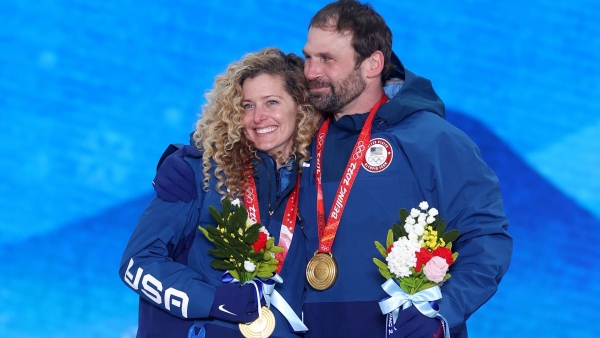American old hands Nick Baumgartner and Lindsey Jacobellis landed a glorious gold in the Winter Olympics mixed team snowboard cross on Saturday.
Jacobellis, 36, followed her individual triumph earlier in the Games by pairing up with 40-year-old Baumgartner, who became the oldest snowboard medallist in Olympic history.
Mainstays of the United States team, the veterans proved a fine combination in the inaugural staging of the mixed team event.
For Baumgartner, who could only manage 10th in the men's individual event on Thursday, topping the podium marked the pinnacle of his career. At his fourth Games, he finally has a medal to show.
The Michigan man said he had become "hungrier" for success as the years have passed, adding: "As you get older, it's tough to watch the young kids take over and try to push you out of the sport, so that hunger is strong.
"We're embracing oldies for goldies! I don't need a jacket right now as I have an inner fire burning!"
He had a message for all 40-year-olds: that there is no reason to step back from life goals.
"You're never too late to take what you want from life and follow your dreams," Baumgartner said. "You let yourself down if you quit too early, [it] doesn't matter how old you are.
"Our success at our age is a perfect example of that and we both hope our stories can inspire other people to go out there. You get one shot at life, you should live the life you want and don't let anything stop you, [it] doesn't matter how old you are. Hard work is the answer. Go out there and get it."
The brilliant Boe brothers
Norwegian Johannes Thingnes Boe and Tarjei Boe took gold and bronze respectively in biathlon's men's 10-kilometre sprint, a giddy thrill for the brothers who grew up amid standard sibling rivalry.
France's Quentin Fillon Maillet denied them a one-two, but it was a gleeful day for the brothers who also won gold in the mixed relay on the opening Saturday.
Younger brother Johannes Thingnes said afterwards that Tarjei, five years his senior, had been "a pain in the butt until he moved out when he was 16, then we saw less of each other".
"Biathlon is easy compared to all the competitions I've had with him," added the champion. "I'm so proud. I'm more proud of him than I am of myself. A bronze medal means gold to him."
They are the first siblings to win medals in the same individual biathlon race in an Olympics, and Tarjei saluted his brother's development, saying: "I saw it quite early, 10 years ago or maybe earlier, that he would be unbeatable in a few years.
"My goal was to win as much as I could before he grew up, and I did – the start of my career was quite strong. Now he is by far the best athlete in the world."
Big hill, big thrill for Lindvik
Norway's Marius Lindvik won the large hill ski jumping gold, finishing ahead of Japan's Ryoyu Kobayashi and Germany's Karl Geiger.
Poland's Kamil Stoch took fourth place, edged out of the medals as he attempted in vain to win a third consecutive large hill gold.
Lindvik had finished seventh in the normal hill event but made up for disappointment there with two giant jumps as he became Norway's first champion in the large hill discipline since 1964.
"I knew if I had a good day I was going to fight for the medals," Lindvik said. "After the normal hill I took a step back and reset and just looked forward to the big hill.
"It was probably two of my best jumps. It's pretty sick that I managed to perform two good jumps when it counts."
Golden Gao lifts hosts, breaks curse
Tingyu Gao took the men's speed skating 500 metres title in an Olympic record of 34.32 seconds, giving hosts China a fourth gold of the Games.
It made the 24-year-old, who was a bronze medallist four years ago in Pyeongchang, only the second Chinese speed skater to win an Olympic gold medal. Zhang Hong was the first in 2014, winning the women's 1,000m.
Gao said he intended to "go back to school" after achieving his sporting goal and predicted China would be "unstoppable" in speed skating in years to come.
He was China's flagbearer at the opening ceremony, and that has typically been seen as a cursed privilege, with those handed the honour often failing to match expectations when they go into action.
Gao bucked that trend and said: "I was really scared of this, but as the Republic of China's flagbearer, I wanted to win gold for China.
"In the competition, I didn't care about the curse. I think I did very well leading the Chinese athletes to achieve their goals. As a Chinese you need to walk the talk and fulfil your promises."


























